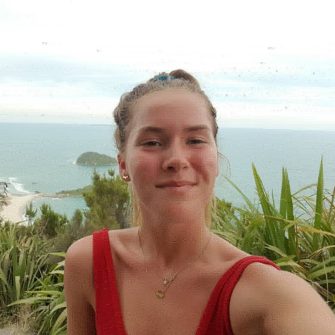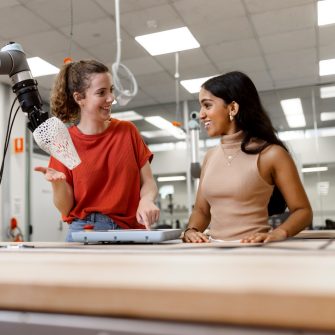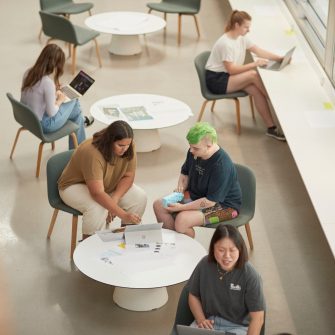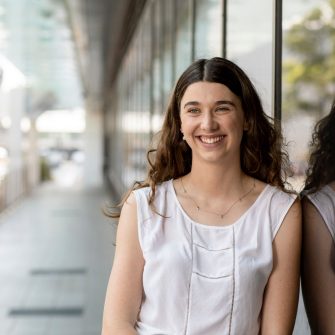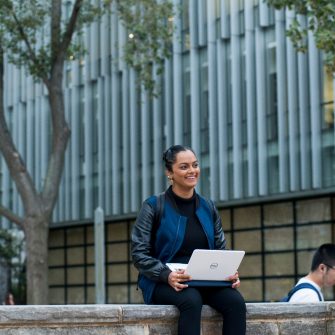Bachelor of Arts
- Commencing Terms
- Term 1, 2 & 3
- Duration
- 3 Year(s)
- Delivery Mode
- Face-to-face (includes blended)
- Campus
-
Kensington
- Codes
- UAC code 422000
- Program code 3409
- CRICOS code 001916C
-
ATAR/2025 lowest selection rank
- 80.0 View all admission criteria
-
2026 Indicative first year full fee
- $14,000*
-
2026 Indicative full fee to complete degree
- $41,500*
-
2026 Indicative first year full fee
- $51,000*
-
2026 Indicative full fee to complete degree
- $160,000*

Application closures for 2026
International applications for all undergraduate programs, as well as postgraduate programs offered by the faculties of Arts, Design & Architecture, Engineering (excluding Master of Information Technology and associated programs) and Science are now closed to New Overseas Student Commencement (NOSC) for 2026 intakes.
Postgraduate programs offered by the Business School and the faculties of Law & Justice and Medicine & Health remain open. Master of Information Technology (and associated programs) also remain open.
- Overview
- Entry requirements
- What will I study?
- Future careers
- Double degrees
- How to apply
- Fees & Scholarships
Overview
Curious about where your strengths and interests could take you? A Bachelor of Arts gives you the freedom to explore widely before focusing on the specialisation that excites you most. With dozens of options across the humanities, creative arts and social sciences, it’s a broad degree that lets you follow your passions, build your skills and shape a path that’s uniquely yours.
Focus on one, two or three study areas with the standalone Bachelor of Arts degree or pursue a double degree alongside another discipline such as Law or Education. Wherever your interests take you, you'll broaden your understanding of the world and gain valuable and versatile skills that are highly sought after in today's job market: critical and independent thinking, problem-solving, evidence-based reasoning, effective communication and creativity.
Prepare to explore foundational questions of human existence, question your assumptions and apply new thinking to academic traditions and real-world challenges. How can we think differently about climate change, human rights, the ethical future of technology, social justice or cultural diversity? The Bachelor of Arts will set you up to make a real difference in a field you love. Where will your passions lead?
Key features
Design your degree, your way
Choose from over 30 disciplines across the humanities, creative arts and social sciences – whatever you’re passionate about, there’s a place for you at UNSW Arts, Design & Architecture. Build your degree around your strengths and aspirations by focusing on one or two disciplines, or pair the Bachelor of Arts with another degree such as Law, Commerce, Social Work or Education. Whichever path you choose, you’ll learn from leading practitioners and renowned academics in an inclusive, supportive environment that celebrates your unique strengths.
Work experience opportunities
Learning from real-world experience is vital to getting ready for your next steps. Put theory into practice with a Work Integrated Learning (WIL) course, or take advantage of our many work placements, internships and industry networking opportunities. We’ll help you arrange unique professional experiences that align with your career goals.
Global opportunities
Broaden your horizons with a study exchange as part of your degree, with more than 300 partner universities to choose from.
Why study at UNSW?
Push the boundaries of your own knowledge
UNSW Arts, Design & Architecture (ADA) is an open, supportive community where you’ll challenge others and be challenged. You’ll be encouraged to push the boundaries of your own knowledge and think outside the box to reimagine, design and deliver sustainable, healthy and socially-just futures for all life on earth. Dream up new initiatives alongside industry at the UNSW Innovation Hub, get involved with hands-on research projects alongside academics, or join one of ADA’s 16+ clubs and societies. Become both a problem seeker and solver and develop an adaptive, future-focused mindset that sets you apart.
Equip yourself for career success
ADA programs are co-created with key industry, government and academic partners to ensure our students receive the highest-quality, relevant and rigorous education. Take advantage of our 1,000+ links to industry partners so you can get hands-on experience outside the classroom, while learning from renowned academics and practitioners on campus. With opportunities for internships, professional placements, networking events, collaborative projects and international exchanges, ADA prepares you to hit the ground running after graduation.
Join a diverse and inclusive community
At ADA, our vision is to seek and solve problems to improve life on earth through creativity, collaboration and inclusion. Together, we listen, challenge, create and share diverse knowledge about people, places and cultures to enable lives with purpose. Here, you’ll find your people and expand your knowledge in a safe, supportive environment that will help you thrive, both professionally and personally.
Entry requirements
-
- The 2025 Lowest Selection Rank (LSR) is the adjusted rank (ATAR plus adjustment factors) you would have needed to gain entry to this degree in 2025.
- The 2025 A levels score is based on four Advanced Level (A2) subjects. Entry scores are calculated from the best three or four A2 subjects (excluding repeated subjects) using the following values: A*=6, A=5, B=4, C=3, D=2, E=1. At most one Applied A Level subject may be included in the best four subjects used to calculate the aggregate.
- The 2025 IB Diploma is an indication of the IB you would have needed to gain entry to this degree in 2025. It is to be used as a guide only.
- The 2025 Lowest ATAR is the lowest ATAR (before adjustment factors were applied) to which an offer was made. Where <5 is listed, this indicates that less than 5 ATAR-based offers were made and so the score has not been published. N/A indicates no offers were made on the basis of ATAR.
*The Lowest ATAR to which an offer was made, for this program, is based on a UNSW Gateway Early Conditional Offer.
-
At UNSW, we are committed to ensuring prospective students have all the information they need in order to make informed decisions about their study options.
To assist you in gaining a better understanding of how Admissions works at UNSW, we have provided you with a summary of ATAR offers and the student profile.
We hope this information will help you identify the degree that is right for you.
Recognition of Prior Learning (RPL)
Domestic students are eligible to apply for the following volume of Recognition of Prior Learning (RPL) credits towards their UNSW degree that belong in the Faculty of Arts, Design & Architecture:
- 1-year Diploma: 48 UoC (equivalent to first year)
- 1.5-year Advanced Diploma/Associate Degree: Up to 72 UoC (equivalent to first year and a half)
- 2-year Advanced Diploma/Associate Degree: Up to 96 UoC (equivalent to two years)
Considering your previous qualifications and their relevance to the chosen program at UNSW, the type and amount of credit you can apply for, as well as the duration of your remaining program, will then be determined.
Assessment by the Program Director is required for RPL applications toward Professional Accredited programs. Please note that eligibility for the full volume of RPL may be subject to accreditation requirements.
Portfolio Entry
At UNSW Arts, Design & Architecture, you will find the freedom and support to design the future you want. A Portfolio Entry submission will demonstrate your passions alongside your best work, to boost your chances of admission to a bachelor’s degree of your choice. For more information and to see specific guidelines for portfolio submissions, visit UNSW Portfolio Entry.
Prerequisites
You don’t need to have completed prerequisite courses, but we do assume you have a Year 12 (or equivalent) level of knowledge.
Adjustment Factors
We offer a range of adjustment factor schemes that reward students for academic performance and extra-curricular achievements. These schemes also take into account a range of personal and educational disadvantages that may have affected your studies.
HSC Plus
This scheme rewards students who perform well in Year 12 subjects that are relevant to their preferred UNSW degree. You may be awarded up to five points.
Elite Athletes, Performers and Leaders (EAPL)
This program recognises achievements in the areas of sport, academia, leadership and music at an elite level. You may be eligible for up to five points.
Educational Access Scheme (EAS)
Factors such as illness, financial hardship, language difficulties or attending a particular school can mean you don't always get the best possible marks in Years 11 and 12. If one of these situations applies to you, submit an application for the Educational Access Scheme (EAS) via UAC. Eligible students can receive between 1 and 10 points towards their chosen UNSW degree.
Admission pathways
Your ATAR is not the only measure of your potential to succeed, which is why we offer a range of pathways into university. Explore your options below and get in touch with our Future Student Advisers to discuss your path to UNSW.
Gateway Admission Pathway
This scheme is open to students who attend Gateway schools, live in a low-socioeconomic area based on IEO index of SEIFA criteria, are Aboriginal and/or Torres Strait Islander, or hold an eligible humanitarian or protection visa. This pathway provides early offers and early conditional offers with a reduced ATAR entry requirement for your preferred UNSW degree.
Entry programs for Australian Aboriginal and Torres Strait Islander people
We offer entry programs for Indigenous Australians, including the Indigenous Preparatory Programs and the Indigenous Admission Scheme (IAS). The entry pathway program you apply for will depend on the degree you want to study.
University Preparation Program
This pre-university program is designed for high school leavers with an ATAR of 50 or above who have experienced educational disadvantage, as well as people aged 20 and over who are looking to return to education without an ATAR. Visit the entry requirements tab on our webpage to check your eligibility. You'll study specially-designed introduction university courses and discipline-specific courses in a supportive environment that will prepare you for a university degree.
English language requirements
You may be asked to provide evidence of your English proficiency to study at UNSW depending on your educational background and citizenship. English language skills are vitally important for coping with lectures, tutorials, assignments and examinations - this is why UNSW requires a minimum English language competency for enrolment.
If you’re completing an Australian Year 12 qualification (e.g. NSW HSC or equivalent), you do not need to provide anything extra to prove your proficiency. Your qualification will be used as evidence of your English proficiency.
If you do need to provide evidence of your English proficiency, this will be indicated in your application. You can prove this by providing evidence that you meet one or more of the following criteria:
- English language tests and university English courses
- Prior study in the medium of English
- Other qualifications
If you need to improve your English skills before you start your degree, UNSW College’s Academic English Programs are for you. The programs are suitable for various English levels and help you prepare for university studies and life in Australia.
For more details, visit the English Language Requirements page.
International direct entry
Information for applicants with CBSE, HKDSE or Singapore A Levels Qualification
Calculating your CBSE Score:
Awarded by CBSE, average percentage marks across English or Hindi, and your best four remaining subjects. Where marks are given as a range, the mid-point for that range is used e.g. 75 to 80 = 77.5.
Calculating your HKDSE Score:
Entry requirements are based on the aggregate of the best 5 achieved category A subjects (category B and C subjects are not considered).
For subjects other than Citizenship and Social Development: level 5**=7 points, level 5*=6 points, level 5=5 points, level 4=4 points, level 3=3 points, level 2=2 points, level 1=1 point, Level U=0 point.
For subject Citizenship and Social Development: Attained=2 points, Unattained=0 point. Citizenship and Social Development will only be counted towards the aggregate if the 2 points awarded for Attained ranks among the student’s best five scoring subjects.
If Mathematics Compulsory Part and Extended Part (Module 1 or 2) are both presented, both scores can be counted.
Calculating your Singapore A Levels:
Due to significant changes to the GCE A-Level Curriculum and University Admissions Score (UAS) calculation effective 2026, UNSW assessment is currently under review.
Note: Entry requirements published on this page are correct as of the day of publication and may change without notice.
We do not accept secondary qualifications from this country. We may accept tertiary study results, please contact us for more information.
Please contact us for direct entry requirements.
Recognition of Prior Learning (RPL)
Typically, international students are eligible to apply for the following volume of Recognition of Prior Learning (RPL) credits towards their UNSW degree that belong in the Faculty of Arts, Design & Architecture:
- 1-year Diploma: Up to 48 UoC
- 1.5-year Advanced Diploma/Associate Degree: Up to 72 UoC
- 2-year Advanced Diploma/Associate Degree: Up to 96 UoC
Generally, International students must ensure that their prior qualifications are assessed and deemed relevant to the program they intend to pursue. Additionally, they are required to maintain a full-time study load as part of the conditions for their Confirmation of Enrolment.
Prerequisites
You don’t need to have completed prerequisite courses, but we do assume you have a Year 12 (or equivalent) level of knowledge.
Admission pathways
If you do not meet the requirements for direct entry into your chosen degree, you may be eligible for a pathway program with UNSW College. UNSW College provides alternative entry options using university-approved content so that you can start your UNSW journey with confidence.
English language requirements
You may be asked to provide evidence of your English proficiency to study at UNSW depending on whether you are from an English-speaking background or non-English speaking background. English language skills are vitally important for coping with lectures, tutorials, assignments and examinations - this is why UNSW requires a minimum English language competency for enrolment.
If English is not your first language, you’ll need to provide proof of your English proficiency before you can be given an offer to study at UNSW. You can do this by providing evidence that you meet one or more of the following criteria:
- English language tests and university English courses
- Prior study in the medium of English
- Other qualifications
If you need to improve your English skills before you start your degree, UNSW College’s Academic English Programs are for you. The programs are suitable for various English levels and help you prepare for university studies and life in Australia.
For more details, visit the English Language Requirements page.
Check the specific English language requirements for this program
What will I study?
UNSW is introducing a new academic calendar from 2028.
We are moving to a new flex-semester calendar. What does this mean for your studies?
Study areas
With a flexible degree tailored to pursue your passion and interests, you'll learn to think critically, communicate across boundaries, and solve problems creatively. Develop these highly demanded skills as you learn to create real-world solutions that apply to a range of exciting career opportunities.
-
You are required to complete at lease a major in one of the following study areas. If you wish, you may choose to complete a second major as well.
Asian studies
Discover our closest neighbours' impact on the world and understand Australia's place within the Asian region.Chinese studies
Explore China’s rich cultural heritage, history and society to gain a competitive edge in the global job market.Criminology
Experience an approach beyond lectures that sees you visiting courts and prisons and hearing first-hand from the people in the justice system.Creative writing
Learn from award-winning writers, join writing masterclasses and events, and create invaluable industry connections.English
Delve into memorable stories, poetic patterns, ringing phrases and imaginative landscapes.Environmental humanities
Immerse yourself in the social, cultural and political factors shaping human relations with the natural world.European studies
Delve into the intellectual history, politics, religion and movement of minority peoples throughout history.Film studies
Tell stories, share human experiences, document reality and expand horizons as an experimental art form.French studies
Learn about the key language for the arts, cuisine, technology, justice and health.Geographical studies
Discover how we can plan for a better future by combining classroom study with hands-on experience in the field.German studies
Develop practical language skills and explore Germany’s fascinating culture, diverse society and complex history.Global development
Learn the many ways we can create practical and positive change at local, national, and global levels.History
Discover a uniquely global perspective taught by passionate, world-class historians.Indigenous studies
Explore the current and traditional Indigenous knowledge, philosophies, and cultural values tied to country.Japanese studies
Learn to communicate in Japanese and explore the rich tapestry of Japan’s culture, history and society.Korean studies
Explore the rich social, cultural and historical context that shapes Korea today.Linguistics
Understand how language policy impacts multilingual and multicultural communities in Australia and around the world.Media, culture and technology
Explore the history, legacy and ongoing impact of media through the 20th and 21st centuries across an ever-changing tech landscape.Music studies
Discover how music can be an expression that defines cultures, societies and as an expression of yourself.Philosophy
Learn how to communicate complicated ideas by thinking clearly, deeply, analytically, and creatively.Politics and international relations
Pave your way for careers in government and business, lead with difference and change the world.Sociology
Join Australia’s oldest sociology department and discover insights from diverse cultures and the lived human experience.Spanish studies
Explore literature, film and art and discover the history and the contemporary cultural context of the Spanish-speaking world.Studies in psychology
Explore the drivers of human behaviour and causes of psychological disorders through investigating the way we interact, learn and ability to cope with pressure.Theatre and performance studies
Learn from industry professionals, collaborate with artists, and gain practical experience with production companies, venues and publishers. -
You must complete at least one of the following minors or a second major listed above.
Art theory
Equip yourself with the critical skills and knowledge to navigate and shape contemporary art and visual culture.Australian studies
Delve into the knowledge and critical insights to understand and engage with Australia's history, culture, and global role.Gender studies
Empower yourself to critically examine gender, sexuality and power, equipping you to drive social change.Digital Social Sciences
Examine how digital technologies reshape power, identity, and society, while teaching you research skills to explore surveillance, activism, and social justice in the digital age.
Indonesian studies
Build your language skills and cultural insights, enabling you to engage meaningfully with one of Australia’s closest neighbours.International political economy
Analyse global political and economic systems, giving you the tools to navigate international policies and power dynamics.Italian studies
Enhance your language skills and cultural insights in Italian, enabling you to engage meaningfully with Italy's rich history, culture and global influence.Modern Greek studies
Refine your language skills and cultural insights in Greek, allowing you to connect deeply with Greece’s history, traditions, and contemporary society.Policy, power and government
Understand the dynamics of political systems and policies, giving you the skills to critically analyse and shape governance structures.Security studies
Explore global security challenges, providing you with the knowledge to analyse and influence international security policies. -
You may also use your free electives and also your general education courses in some cases to complete a third major or minor option from the lists below:
AI in business and society
Unlock the power of AI to drive innovation, make a meaningful impact on society and lead confidently across industries.Economics
Study the analytical tools and gain critical thinking skills that help shape societies, raise living standards and promote economic growth.Human resource management
Build the people skills that set you up for success in a diverse and rewarding career.Innovation, strategy and entrepreneurship
Learn how to lead with confidence, discover new opportunities, turn insights into action and design business strategies that create, capture and deliver value.International business
Change how the world does business as you make the most of your strong foundation in business, commerce and economics.Marketing
Learn how data helps businesses stand out, understand customer behaviour, provide different experiences and meet customer needs.Studies in psychology
Explore the drivers of human behaviour and causes of psychological disorders through investigating the way we interact, learn and ability to cope with pressure. -
You may also use your free electives and also your general education courses in some cases to complete a third major or minor option from the lists below:
- Animation and Moving Image
- Communication and Journalism
- Computational Design
- Game Art
- Graphic Design
- Industrial Design
- Information Systems
- Integrated Design
- Public Relations and Advertising
- Screen Production
- Textiles and Fashion Design
- Visual Arts
- Working with Communities
Where can you study communications and public relations? In our Bachelor of Media.
Program structure
You can study the Bachelor of Arts at UNSW as a standalone degree or as part of a double degree. This page covers the standalone program, which includes 24 courses and 144 UOC. You’ll typically study eight courses a year if you study full-time. You can also study part-time and take advantage of a flexible study load.
In your Bachelor of Arts, you will typically complete two specialisations. You can choose to complete an optional third specialisation. Specialisations are organised into majors and minors. You’ll typically find eight courses in a major and six courses in a minor.
You can structure your Bachelor of Arts in three different ways:
- Major + minor: At minimum, you will choose one major and one minor. You’ll then typically have eight elective courses and two general education courses.
- Double major: Alternatively, you can choose two of your elective courses to turn your minor into a second major. This will typically leave you with six free electives and two general education courses.
- Third major or minor options: In some cases, you can use your free Electives and general education courses to complete a third major or minor option from ADA or UNSW Business School.
When you complete a bachelor’s degree, you’ll be eligible for further study at a postgraduate level. If you’d like further information about this degree and its learning outcomes, take a look at our student handbook.
Future careers
A Bachelor of Arts is your launchpad to many different career paths. Whether you’re drawn to the creative industries, government and diplomacy, cultural institutions, or research and advocacy, a BA equips you with versatile skills that transfer across sectors. The examples below highlight just some of the roles that our graduates pursue.
Potential careers
| Sector | Example roles |
| Arts, media and creative industries | Actor, creative consultant, content adviser/producer, media consultant, publisher, set manager, social media producer, writer |
| Brand, marketing and communications | Brand/marketing coordinator, communications specialist, corporate social responsibility adviser, market research analyst |
| Cultural institutions and heritage | Education program coordinator, exhibition coordinator, gallery manager, museum manager |
| Education and training | Academic services officer, student support officer, teacher (with further study), training facilitator |
| Government, politics and diplomacy | Diplomat, government administrator, international representative, policy analyst, political strategist, public servant |
| Not-for-profit and international relations | Activist, advocate, community worker, fundraising and partnerships coordinator, program officer |
Explore your career options
Many career options lie ahead in your future. If you don’t know what you want to do yet, it’s ok. University is the time to test your ideas, discover potential career paths, or develop the knowledge to create a job that doesn’t even exist yet.
Along with flexible course options, degrees from UNSW Arts, Design & Architecture include opportunities to experiment with professional roles in internships and work placements. Wherever the future takes you, you’ll be set for life with experience and contacts among your classmates, lecturers and UNSW graduates worldwide.
Our alumni
"Studying a Bachelor of Arts at UNSW really made the world my oyster. The breadth of disciplines meant that I could craft my degree to study exactly what I needed to shape my career."
Cody Williams
Public Diplomacy Assistant, Australian Embassy Tokyo
Double degrees
Combine talents and passions to open future opportunities suited to your unique strengths. Despite the name, double degrees are not double the workload! You'll study core courses in two areas of expertise, graduating with two qualifications in less time than it takes to complete two consecutive degrees.
Double your knowledge, skills, and career options with the Bachelor of Arts and:
How to apply
Applications for undergraduate study from domestic students (Australian citizens, Australian permanent residents, Australian permanent humanitarian visa holders and New Zealand citizens) are processed by the Universities Admissions Centre (UAC).
Visit the Apply section of the UAC website and you can nominate up to five degrees in order of preference, with the first being your most desired degree and university.
On-time applications for admission usually close at the end of September each year for Term 1 admission. Late applications can be submitted, but a late fee will apply. For study starting in Term 1, the majority of offers are made in December and January. Visit the UAC website for key dates for admission outside of Term 1.
Ready to start your application?
For most international students, applications are submitted via our Apply Online service. We encourage you to submit your completed application as early as possible to ensure it will be processed in time for your preferred term.
Some high-demand programs with limited places, may have an earlier application deadline or may have an earlier commencement date. For details, visit the international admissions information page.
*If you are an international student studying an Australian qualification, go to the Universities Admission Centre (UAC) for application and UAC key dates. Note: If you are under 18 years of age, you need to make special arrangements. For details, visit the under 18 international students page.
Ready to start your application?
Fees & Scholarships
Commonwealth Supported Place: Student Contribution Band 4
*The student contribution for a Commonwealth Supported Place is an indication only of the amount payable in Year 1 based on a standard full-time load of 48 credit points (1.0 EFTSL). The actual student contribution you will be liable for depends on your individual program of study and the calendar year in which you enrol. Actual fees are calculated upon enrolment. Student contribution amounts are subject to annual review by the university and may increase each year during your studies (subject to caps determined by the Australian Government), effective at the start of each calendar year.
The indicative fees listed here are based on an estimated average and are for tuition only - other fees and charges are not included.
*Fees are subject to annual review by the University and may increase annually, with the new fees effective from the start of each calendar year. The indicative fees listed here are based on an estimated average and are for tuition only, other fees and charges are not included. The amount you pay will vary depending on the calendar year to enrol, the courses you select and whether your study load is more or less than 1 Equivalent Full Time Student Load (8 courses per year).
Indicative fees are a guide for comparison only based on current conditions and available data. You should not rely on indicative fees. More information on fees can be found at the UNSW fees website.
Indicative fees to complete the program have been calculated based on a percentage increase for every year of the program. Fee increases are assessed annually and may exceed the indicative figures listed here.
Indicative fees to complete the program include tuition plus an estimate of study-related costs of approximately $1,000 per year. To find out more about other costs, visit UNSW International.
Scholarships
At UNSW, we award over $83 million in scholarships each year. We pride ourselves on rewarding excellence and making university accessible to students from all walks of life. Whether you’re a domestic or international student, our range of scholarships, prizes and awards can support your journey.
Progress starts here – at a world-leading university

Top 20 Worldwide
UNSW is ranked #20 university in the world
QS World University Rankings, 2024–2026

Most Employable Graduates
Winner of the AFR Most Employable University Award seven years in a row
AFR Top100 Future Leaders Awards, 2020–2026

Australia's #1 for Innovation
Highest number of startups and spinouts from university-developed tech
SCOPR report, 2024

